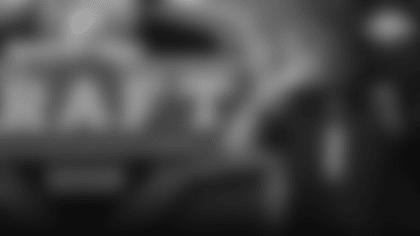Editor's note: This is the second of five Q&As with current Falcons players, detailing their journey through the draft process.
FLOWERY BRANCH, Ga. – The NFL Draft includes some of the biggest stars college football has to offer, but it's mostly comprised of former small-school standouts who are largely unknown to many NFL fans.
RELATED CONTENT
Deadrin Senat falls in the latter category. Few people outside of NFL scouts and personnel types knew who Senat was entering the draft, despite the defensive tackle recording 66 tackles, 10.5 tackles for a loss and six sacks in his senior season at South Florida. For comparison, Clemson's Christian Wilkins, a top defensive tackle prospect in this year’s draft, had 51 tackles, 14 tackles for a loss and 5.5 sacks in his senior year – and he's largely being projected as a first-round pick. Then again, playing for the national champs certainly helps you get noticed, too.
The draft journey for a player coming out of a small school can be very different compared to someone coming from a Power 5 program, such was the case for Senat.
With the NFL Draft just around the corner, we asked Senat about his own path to Atlanta.
Question: What do you remember most about your draft journey?
Senat: Something that I remember the most is that it's all about the details. In college, you can play off pure talent. You're playing based off of you being better than the person you're going against. You aren't really detailing the little things. You aren't scheming how to beat them. You aren't coming up with a couple of moves to use and take it to them. You take the game to a whole other level. I felt like in college I took my game to another level, but when I got here it had to go to a whole other level.
Q: If you could give yourself any advice as a draft prospect what would that be?
Senat: Looking back, thinking about it, I did things according to plan. It played out the way it was meant to be. I'm a firm believer in things that are meant to be will be. I feel like everything played out the way it was, and now it's time to grow. Now it's time to learn from it, so I wouldn't change anything. Now, I'm looking back going into my next year. There's a lot of things I want to improve on, I want to grow on. I want to be a better me, mind, body and soul.
Q: Do you think your path to draft was different coming out of South Florida?
Senat: Absolutely. I felt like that since the beginning. I felt like nobody really knew who I was and people didn't really know that I could play ball, and some people probably overlooked me. But I'm past that. That happened and I'm here; God placed me here so now I'm going to take full advantage of my opportunity. But, of course, I've felt that way since I went to school there. I've realized without that publicity nobody knows who we are. There's a lot of good players on that team, who could have had good chances (to get drafted).
Q: Was there anybody who was influential to you throughout the draft process?
Senat: I had a couple of people in my corner. I had my main man Tony Navarro, we're really close. He was there and was just like a friend to me. He was like a mentor, a friend, we talked about life with each other, we both went through tragedies. I had him in my corner, I had Homer Betancourt, my pastor. I spoke with him all the time. He's blind now, he was in my corner and kept me with my faith. He kept me strong and texts me every day, even though he's blind. Of course, I had my family. I had my nieces, I had my sister, I had my brother, who's in jail. I had those guys in my corner, who were with me through the good, the bad and the ugly.
Q: What was your favorite part about the whole draft process?
Senat: My favorite part about the whole process would be just being in the locker room and being around these guys. I've never been a part of a brotherhood like this. In college, it was just like, 'Oh, I've got to get it. I've got to outwork these guys.' Now, you're still working but you're getting to know these guys. You're creating a bond with them and knowing that – yeah, you're in the league, yeah, you're getting paid, yeah, it's a business – but it's also a brotherhood. That really shocked me. Just seeing how coach Quinn really sees that possibility and the guys believe in that brotherhood. That was my favorite part.

















